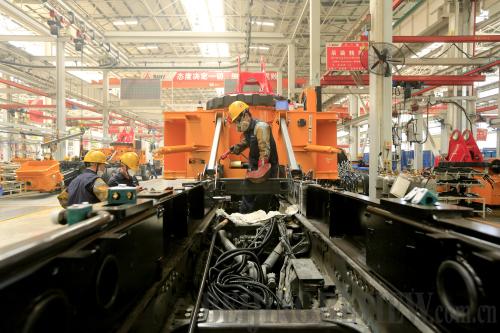A legal first in Sany's US wind farm case
Updated: 2012-10-30 16:49
(bjreview.com.cn)
|
||||||||
Seven years after Sany established its presence in the United States, the world's sixth largest machinery manufacturer has a base in both Atlanta and Wisconsin. Its operations in the United States have involved hundreds of millions of dollars and created hundreds of jobs.
|
 Employees work on the construction machinery at an assembly shop of Sany Heavy Industry Co in Changsha, Hunan province on July 12. [Photo / CFP] |
Despite assurances from Sany's senior executives, the lawsuit is viewed as a long shot given that courts do not often second guess the executive branch on security issues, said analysts. Tim Tingkang Xia, an attorney representing Ralls, acknowledged that the case will be tough as the courts routinely agree with decisions made by the committee.
"It is going to be a tough battle," said Josh Zive, a lawyer with Bracewell & Giuliani who has handled CFIUS cases for 10 years. Zive said the courts tend to stay away from second guessing the executive branch on national security issues. "There is a large amount of discretion given not only to agencies, but in the context of national security, that will make it difficult to win."
Xiao Shunwu, an associate professor at Southwest University of Political Science and Law, also said Sany has a slim chance of winning its case.
"If a US company sues president Obama, it may win. But it will be extremely difficult for a Chinese company to win such a case. In a country with the most advanced jury system, the US citizens, who are currently mired in an economic crisis, are apt to rule against the interests of foreign companies."
Significance
Chinese investment in the United States has been blocked before on grounds of "national security".
In 2009, CFIUS forced the Chinese-owned Nonferrous International Investment Co to backtrack on a proposal to buy Nevada-based Firstgold, whose properties were close to a naval air station.
And in 2011, Chinese telecom maker Huawei had to relinquish plans to buy some assets from US server technology firm 3Leaf after CFIUS ordered Huawei to give up some parts of the deal.
Recently, the US House of Representatives Intelligence Committee issued a report alleging that Huawei and ZTE, another Chinese high-tech company, posed a possible threat to US national security.
The report recommended that regulators block Huawei and ZTE from acquiring US companies, adding that government computer systems should not include components made by the two companies on fear they "might pose an espionage risk".
However, a White House-ordered review of possible security risks found no evidence that either company had been involved in spying.
Niu Xinchun, Vice President of the Institute of American Studies at the China Institutes of Contemporary International Relations, said there is a tendency for US politicians to believe that "whatever the reason, being tough on China is safe."
Although the chances of Sany winning the case are slim, it signals a new era for Chinese companies seeking to protect their interests in overseas markets through legal means, experts said.
They also warned that the case could have consequences on Chinese investment in the United States.

 Relief reaches isolated village
Relief reaches isolated village
 Rainfall poses new threats to quake-hit region
Rainfall poses new threats to quake-hit region
 Funerals begin for Boston bombing victims
Funerals begin for Boston bombing victims
 Quake takeaway from China's Air Force
Quake takeaway from China's Air Force
 Obama celebrates young inventors at science fair
Obama celebrates young inventors at science fair
 Earth Day marked around the world
Earth Day marked around the world
 Volunteer team helping students find sense of normalcy
Volunteer team helping students find sense of normalcy
 Ethnic groups quick to join rescue efforts
Ethnic groups quick to join rescue efforts
Most Viewed
Editor's Picks

|

|

|

|

|

|
Today's Top News
Health new priority for quake zone
Xi meets US top military officer
Japan's boats driven out of Diaoyu
China mulls online shopping legislation
Bird flu death toll rises to 22
Putin appoints new ambassador to China
Japanese ships blocked from Diaoyu Islands
Inspired by Guan, more Chinese pick up golf
US Weekly

|

|







